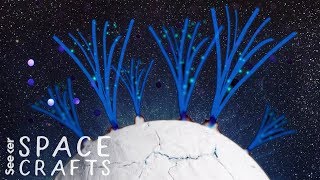This is Enceladus, an icy moon revolving around Saturn.
这是土卫二,围绕土星运转的一个冰冻星球。
Unimaginably cold, this white orb looks very peaceful.
这里的寒冷难以想象,这个白色星球看起来非常宁静。
Except that it's actually home to ice volcanoes that spew frozen chunks of slushy magma at 800 miles per hour.
这里遍布着冰火山,它们以每小时800英里的速度喷出岩浆冻块。
Cryovolcanoes are similar to the ones we have on Earth, just swap out the molten lava with sub-zero water.
冰火山与我们地球上的火山相似,不同之处在于它喷发出的熔岩夹杂着冰。
A cryovolcano forms when thick layers of ice get heated by gravitational forces.
当厚厚的冰层被引力加热时,冰火山便形成了。
Then pockets of water are created under the moon's icy shell.
随后,土卫二冰层下便形成了水凹。
Pressure eventually builds in these liquid pockets, and when a crack on the surface opens, icy plumes erupt!
压力不断在水凹里聚积,一旦表面缝隙开裂,冰团就会喷薄而出!

Those plumes are so cold, that if you were standing next to an erupting ice volcano, you'd turn into a block of ice.
那些冰团寒冷至极,如果你此时此刻站在正在喷发的冰火山旁边,那么你(瞬间)将冻成冰块。
Inside the plumes magma are a mixture of carbon dioxide, water methane gas, and ammonia.
在这些冰冻岩浆内部是二氧化碳、水、甲烷气体和氨的混合物。
These ingredients have scientists excited -- because these elements are the crucial building blocks for life.
这些成分让科学家们兴奋不已,因为这些是构建生命的关键要素。
But what kind of organism could possibly survive in Enceladus's ice cold waters and in pitch black darkness?
但什么样的生物能在土卫二冰冷的水域以及漆黑的环境中生存呢?
It won't be space dolphins and narwhals, but if anything, it could be like the extremophiles at the bottom of our oceans - the odd looking creatures that feed on microbes near underwater vents.
应该不会是太空海豚和独角鲸,但如果有的话,它们可以与我们海洋底部的极端微生物类似,它们长相怪异,以水下泉口的微生物为食。
So to reiterate, huge cold dangerous ice volcanoes exist and they might birth alien life.
因此,我在此重申,巨大冰冷而又危险的冰火山的确存在,而且他们可能孕育外星生命。


